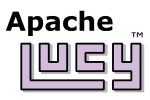NAME
Lucy::Search::Query - A specification for a search query.
SYNOPSIS
# Query is an abstract base class.
package MyQuery;
use base qw( Lucy::Search::Query );
sub make_compiler {
my ( $self, %args ) = @_;
my $subordinate = delete $args{subordinate};
my $compiler = MyCompiler->new( %args, parent => $self );
$compiler->normalize unless $subordinate;
return $compiler;
}
package MyCompiler;
use base ( Lucy::Search::Compiler );
...
DESCRIPTION
Query objects are simple containers which contain the minimum information necessary to define a search query.
The most common way to generate Query objects is to feed a search string such as ‘foo AND bar’ to a QueryParser’s parse() method, which outputs an abstract syntax tree built up from various Query subclasses such as ANDQuery and TermQuery. However, it is also possible to use custom Query objects to build a search specification which cannot be easily represented using a search string.
Subclasses of Query must implement make_compiler(), which is the first step in compiling a Query down to a Matcher which can actually match and score documents.
CONSTRUCTORS
new
my $query = MyQuery->SUPER::new(
boost => 2.5,
);
Abstract constructor.
- boost - A scoring multiplier, affecting the Query's relative contribution to each document's score. Typically defaults to 1.0, but subclasses which do not contribute to document scores such as NOTQuery and MatchAllQuery default to 0.0 instead.
ABSTRACT METHODS
make_compiler
my $compiler = $query->make_compiler(
searcher => $searcher # required
boost => $boost # required
subordinate => $subordinate # default: false
);
Abstract factory method returning a Compiler derived from this Query.
- searcher - A Searcher.
- boost - A scoring multiplier.
- subordinate - Indicates whether the Query is a subquery (as opposed to a top-level query). If false, the implementation must invoke normalize() on the newly minted Compiler object before returning it.
METHODS
set_boost
$query->set_boost($boost);
Set the Query’s boost.
get_boost
my $float = $query->get_boost();
Get the Query’s boost.
dump
my $obj = $query->dump();
load
my $obj = $query->load($dump);
INHERITANCE
Lucy::Search::Query isa Clownfish::Obj.
Copyright © 2010-2015 The Apache Software Foundation, Licensed under the
Apache License, Version 2.0.
Apache Lucy, Lucy, Apache, the Apache feather logo, and the Apache Lucy project logo are trademarks of The
Apache Software Foundation. All other marks mentioned may be trademarks or registered trademarks of their
respective owners.
